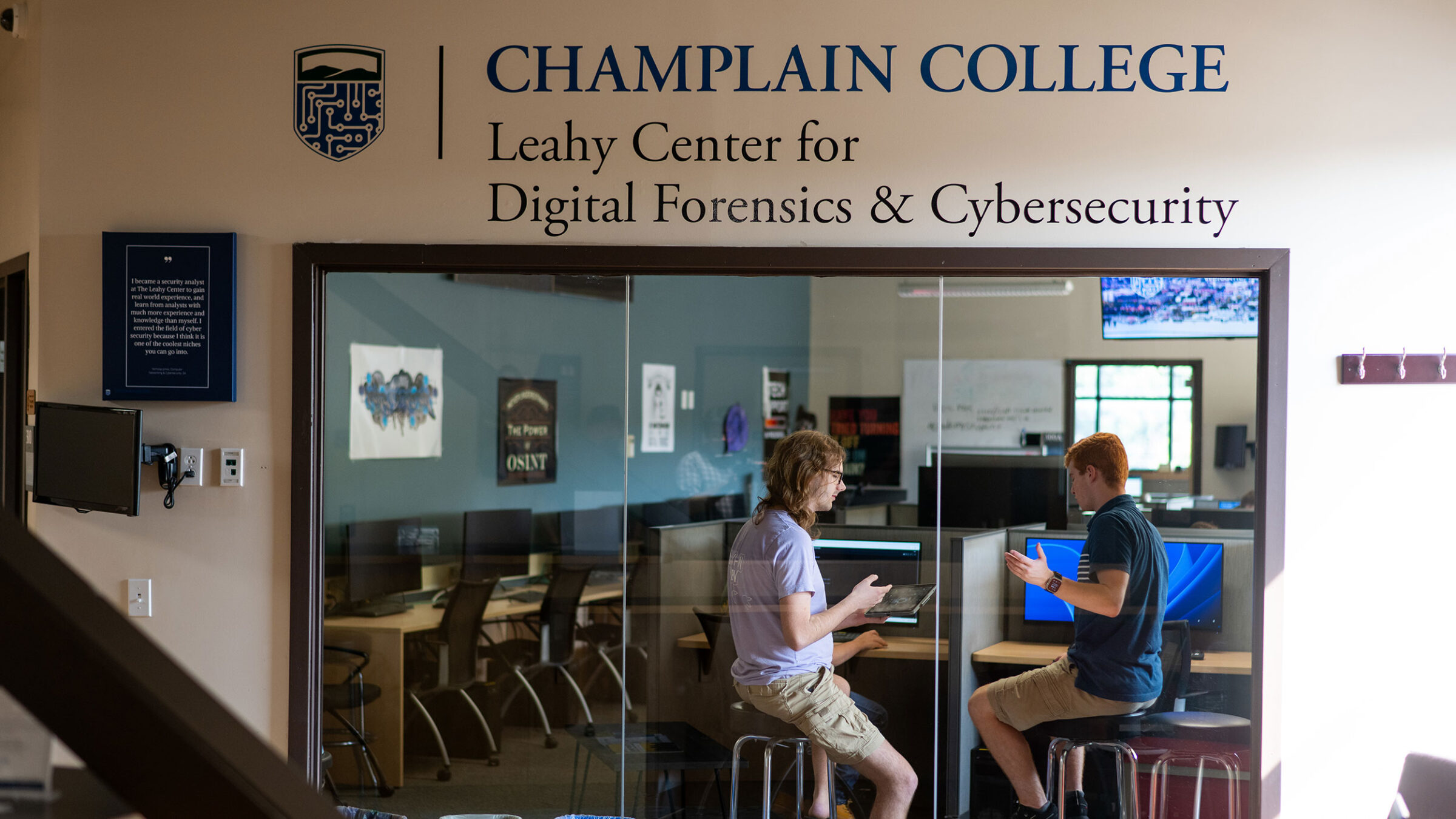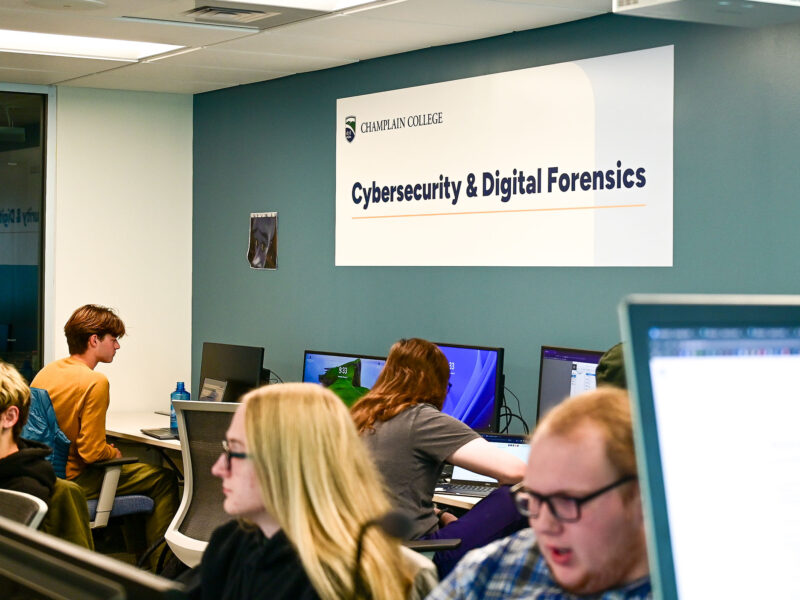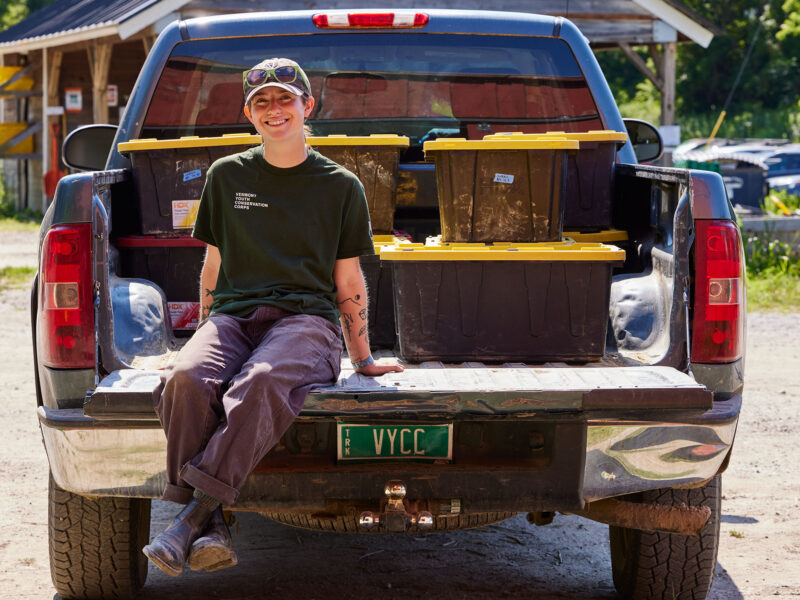What’s New at the Leahy Center

At the Leahy Center for Digital Forensics & Cybersecurity, we are always working on something new and innovative. One day it might be scootering around the Lakeside parking lot for data generation, the next might be network maintenance. And while we can’t get super detailed about the kinds of clients and projects working on, we can share a little bit about what goes on behind the glass walls at the Leahy Center.
Let’s take a deeper look at some of the ongoing projects!
Internet of Things (IoT)
The Internet of Things Team is composed of five different departments: Analysis, Offensive, Mobile, Database, and Extraction. The common thread of them all is analyzing the software and hardware components of various IoT devices. With this information, they will be able to help educate law enforcement and government officials on IoT.
A typical day for an IoT team member depends on what department students are in. For those in Analysis, by using IoT devices—such as our scooter example from earlier—students generate data to determine what info might be retrievable later on via forensics and chip-off analysis.
Meanwhile, IoT Mobile might use AirTags to recreate possible kidnapping cases to curate a test and answer sheet. This scenario would include questions that officials can use to solve the case with provided data. Government officials would be trained on these tests and use the provided answer sheet to check their results. Finally, students with programming skills might be part of the IoT Database or Extraction teams, maintaining a database with information about all of the IoT devices we’ve tested or working on programming applications that will help extract information from said devices.
The Cyber Range Team
Aptly named, The Cyber Range Team at the Leahy Center builds and maintains a network environment that is safe to practice breach and hacking scenarios, known as a “cyber range.” A multidisciplinary team, Cyber Range students focus on pen-testing, programming, or their system management skills. The Cyber Range team gets to practice all three. While it is a challenging team, it also provides a ton of opportunities for growth and learning.
This team is rapidly growing and recently received a $3.4 million grant to maintain a cyber range for the United States Secret Service. With this, students help maintain the network that the United States Secret Service can use to train their members on cyber-crimes. Breaches, malware, and ransom scenarios can be safely practiced through the network without compromising critical data or opening up vulnerabilities in main networks. The United States Secret Service can use this technology to practice these scenarios and strengthen national security.
Want to Get Involved?
Whether you are looking to be part of a professional client-focused project or to conduct research on trending topics in the technological industry, or you’re seeking the services of the Leahy Center as a client, we’re happy to talk shop and see how we can help.
Contact the Leahy CenterCybersecurity Risk Assessment
Our Risk Assessment team works directly with clients to test their IT networks and create assessment reports about their findings. This team focuses on both the cybersecurity and business parts of the field. On the cyber side of things, Leahy Center students will typically take a deeper look into their client’s IT infrastructure and assess their vulnerabilities for things like how the infrastructure could be affected by malware, ransom attacks, or potential hackers. Afterward, they will compile a professional report detailing their findings. Then, students on the business part of the team will review the report, meet with them in person, and provide recommendations for a plan to improve the client’s infrastructure.
TechnoCon
New for us at the Leahy Center, we had the opportunity to send a group of students to Wilmington, North Carolina, this summer to attend the Techno Security & Digital Forensics Conference (TechnoCon), where we created a Capture the Flag (CTF) competition for the conference.
A CTF is a cyber competition that follows the same basic format as a traditional game of Capture the Flag, but instead, players gather information given in files, clues, or even fully simulated attack scenarios, and solve questions to score points. Leahy Center students Avery Luther (Cybersecurity ‘26), Adam Hachem (Cybersecurity ‘25), and James Cangelosi (Digital Forensics ‘26) went all out for the TechnoCon CTF and built a full simulation of a cyber attack to set the stage for the competition. I had the opportunity to go deeper with Adam Hachem to hear more details.
“We recorded all the data, and we collected images by capturing everything that’s on the disks of the devices that are involved. Then, we wrote questions for it, and we gave it to industry experts as part of a game.” Hachem said, “They’re tasked with answering these questions as fast as possible, and whoever gets the most points wins.”
Not only were they able to write the CTF itself, but the three Leahy Center students were also able to run the event, including getting to announce the winners at TechnoCon’s 25th anniversary reception, surrounded by the best in the business.
“We sat in the front of the room with the CIA, the FBI, all of the three-letter-words,” Hachem said, “It was so cool, the people there are a thousand times smarter than you could even imagine.”
With the success of this year’s CTF, the Leahy Center has already been invited back for next year’s conference.
Looking for more information about Champlain College? Start here!
Fill out the form to receive helpful information!
Author

More Inside The View
Ideas
From the minds of our students, faculty, and alumni.
News
The latest from Champlain College.
People
Champlain is more than just a place; it's a community.
Places
On campus, in Burlington, and beyond.
Events
Check out our many campus events and get involved! Refine your search by using the filters or monthly view options.


